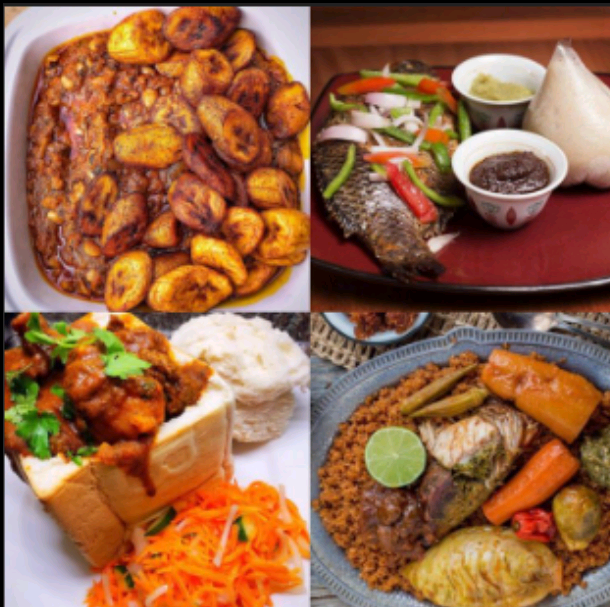If you are a lover of good food, then waste no time in sampling the many delicacies that typify Nigerian cuisine. Nigerian cuisine is a hefty bouquet of diverse foods, flavors, spices and ingredients from all over the nation. They are as diverse as the over 200 ethnic groups of the country. Each ethnic group promises to serve its own culinary inspiration, tastes, and experiences that are too yummy to forget.
But in spite of the diversity of rich traditional dishes, there are standard staples, iconic foods, and spices well known across Nigeria. You might call them signature Nigerian foods – famously projecting the Nigerian identity wherever they are prepared and tasted.
Additionally, the unique and diverse flavours of Nigerian cuisine are unbeatable. They promise to reward you with a deeply satisfying, unforgettable experience. Join us to sample the diverse flavours and ingredients of Nigerian cuisine, and make a mental note to eat them (if you have not).
Bold and Sharp Flavours – A Celebration of Spices and Herbs
As you move from one region of Nigeria to another, you will most likely encounter a range of aromatic, sharp-tasting, and flavourful herbs, spices and seasoning used for cooking. They achieve culinary harmony with the addition of palm oil, crayfish, and the well-known locust bean (Dawadawa/Iru/Ogiri), widely used as seasoning.
Again, virtually every soup or stew in Yoruba land is baptized with the hot flavours of a variety of peppers. The soups and stews cooked by the Igbo and Niger Delta tribes are well known for their broad assortment of nutrient-dense ingredients, herbs, and sharp spices. You will dread and love the spicy richness of meals such Pepper soup, Nkwobi, Isi-Ewu, and Ukodo all at once. While the Hausa tribe will present you with tasty and rich soups, abundantly infused with spices and herbs as well.
You will be amazed at the large number of native and imported spices and herbs used for cooking Nigerian dishes. Common examples include ginger, garlic, onions, thyme, curry, bay leaf, rosemary, cloves, nutmeg, and several others. Herbs and vegetables such as bitter leaf, basil, fluted pumpkin leaves (Ugwu), okra, uziza, ukazi, kale, spinach, jute, baobab leaves are also abundant. There are scores of others, both native and imported ones.
Nigeria’s Staple Foods According to Region
Regional factors such as closeness to the ocean coast, the surrounding vegetation, and climate, determine the common foods cooked in each locality.
One will certainly find an abundance of seafood in coastal areas and the Niger Delta regions of southern Nigeria. It is also interesting to know that Nigerians love plenty of animal protein in their meals. A good mix of fresh and/or smoked (or dried) meat, cowhide, fish, poultry, and eggs, are nearly inseparable from Nigerian dishes.
Further inland in the forest regions, tubers (such as yam, cocoyam, cassava, and potatoes), plantain, and several vegetables are grown and consumed there. The grassland and arid climate of northern Nigeria favors the cultivation of grains (rice, sorghum, maize, guinea corn, millet, cowpea, soya beans, groundnut etc.).
Thus, you should expect to find nutrient-dense Nigerian dishes such as:
- Pounded yam and Porridge (made from yam, cocoyam and potato)
- Rich soups and stews. They include variety seafood okra, ofe nsala, edikang ikong, banga soup, fisherman’s soup, egusi stew, spinach stew, baobab soup, ogbono soup, and groundnut soup. And there are many others. These soups and stews are often cooked with a rich mix of protein. They include varieties of fresh and/or smoked fish, meat (from sheep, goats, cows) and poultry (chicken, turkey, or guinea fowl). Other nutritious additives like crabs, prawns, mushrooms, snails, and periwinkles may be added.
- Plantain in all its tasty variations: boiled, roasted, fried, pounded, dried and ground into flour, or even prepared as snack.
- Iconic starchy meals such as tuwo (semi-solid, steamed maize/millet/rice/guinea corn), garri (cassava flakes) and fufu (cassava starch)
- Highly popular and rich rice dishes such as jollof rice, fried rice, rice and beans, coconut rice, native variety rice, and rice cakes (masa).
- Varieties of beans widely consumed all over the nation. Common bean dishes include bean pudding (moin-moin and ekuru), bean cakes (akara), watery bean soup (gbegiri), bean stew, bean porridge, adalu (bean and maize stew), and okpa (bambara nut pudding).
A Sweet Harvest of Fruits
There are scores of tropical fruits (and vegetables) that can serve as nutritious accompaniments to Nigerian meals. The likes of garden eggs, oranges, papaya, avocado, jackfruit, pineapple, tomatoes, mangoes, bananas, and several imported ones (like a and watermelons for instance). They are often available both in their season and off-season.
And in spite of how the hot climate often affects their freshness, these fruits are abundantly available throughout the year. In modern times, some of these fruits are now prepared, stored and served fresh as juices and smoothies.
Refreshing Drinks that Accompany Nigerian Cuisine
Additionally, certain special crops are used in the preparation of very refreshing drinks. For instance, hibiscus leaves or sorrel combined with ginger, are used to prepare the highly-popular Zobo juice. Tigernuts are used to prepare tigernut milk. Soya beans are used in preparing rich soya milk. Kunu is a nutritious food-drink made from blending tigernuts and grains (millet or guinea corn). Fura da nunu is another tasty food-drink made from cow milk and blended grains (millet, sorghum or perhaps guinea corn).
And that’s not all. The iconic palm wine is too sweet to ignore. This yeasty sap of oil palm trees is a popular celebration and feasting drink in Nigeria. It is more easily found in southern Nigeria (where oil palm trees are plentiful).
Super Street Snacks
If you have not tasted the yummy street snacks of Nigeria, you are missing out big. We have already mentioned a number of them: akara, moin-moin, roasted plantain and plantain chips. And lately, okpa (bambara nut pudding from southeast Nigeria) has joined them.
But there are several others you need to try. Roasted or boiled fresh maize has a heavenly taste; and of course popcorn tastes wonderful. Chewy processed nuts such as groundnuts, cashew nuts, and coconut candies are sold around town. And the equally sweet groundnut derivatives such as dankwa (energy balls) and kulikuli (groundnut flakes). They are so tasty, that they will make you forget all sorrows (at least temporarily).
Again, you would not want to miss the tantalising fried yams and potatoes served with pepper and/or tomato sauce.The crunchy chips of fried wheat batter known as chin-chin is exceptionally tasty. There are also the deep-fried balls of sweetened wheat batter known as puff-puff; and the baked version called (rock) buns. They are unbelievably satisfying.
But the king of street foods remains the iconic Suya – spicy grilled and skewered meat. It is typically sold in the evening by male northerners on the streets and towns of Nigeria. Popular accompaniments of this super-delicious snack include sliced tomatoes, onions, cucumbers, peppers, and the signature Yaji sauce that always goes with it.
Conclusion
Wherever you go across the length and breath of Nigeria, a huge assortment of tasty Nigerian cuisine will be waiting for you. It promises to be an unforgettable experience.







